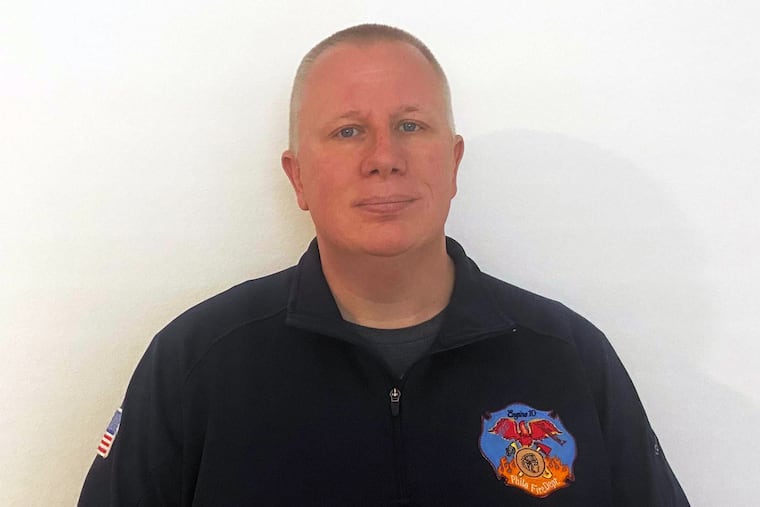Here’s hoping a terminally ill firefighter’s last wish is granted before it’s too late | Jenice Armstrong
“All I want is for them to acknowledge that the cancer that I have is work-related,” Battalion Chief John Narkin said.

I just spotted a small jewelry box on the kitchen counter, which makes me happy. Santa’s got me covered this year.
If only it were that simple for Battalion Chief John Narkin.
More than anything this Christmas, the 25-year Fire Department veteran who is terminally ill with a rare cancer wants something that doesn’t come from a store.
“All I want is for them to acknowledge that the cancer that I have is work-related,” he told me. “Then, when my death comes — it’s going to be sooner rather than later, and I accept that — my wife will be entitled to certain benefits.”
By “them” he meant the city.
His saga began in 2017 when his wife, Rebecca, noticed a lump on his back. The spot was tender but Narkin — a hazardous materials technician — didn’t think it was a big deal. His doctor initially assumed the same but a pathology report revealed that it was a rare malignant tumor called myoepithelial carcinoma.
In 2018, physicians discovered that the cancer had metastasized to his lungs. The following month, Narkin notified the city that he was seeking benefits through Pennsylvania Firefighter Cancer Presumption provisions of the Workers’ Compensation law that presumes a firefighter’s illness is work-related, provided that they meet specific criteria.
“Within 24 hours of my saying that I had occupational cancer, they denied my claim,” Narkin, 50, told me. “I felt discarded and angry.”
According to his denial letter, it was because “the employee did not suffer a work-related injury. The definition of injury also includes … a disease contracted as a result of employment.”
» READ MORE: A union of Philly firefighters is ‘fractured’ by its endorsement of Trump
Meanwhile, oncologists were working hard to save him, trying chemotherapy, radiation, cryogenic ablation, and immunotherapy.
Having been a caregiver, I have seen firsthand how nasty the side effects from cancer treatments can be. Some make patients feel even worse than the cancer itself. I can’t imagine going through that and still reporting for full-time work as Narkin has.
He is a lot tougher than most. Narkin is saving his sick leave for when he no longer can work. Recently, he was assigned to administrative duty, which was a blessing.
It’s a shame that after such a long career in the Fire Department, that it has come down to this.
“I want closure, knowing that my family will be taken care of when I go,” he told me. “That’s basically it.”
Bryan P. Coughlin, a treasurer for Philadelphia Fire Fighters’ & Paramedics Union Local 22, said the way it stands now, Narkin will get a pension of $66,771 per year along with five years of medical coverage. After his death, his widow would be entitled to receive half of that — $33,386 — for the rest of her life. Rebecca also would be entitled to medical care for the remainder of the time that Narkin was eligible.
But if Narkin is successful and his cause of death is deemed service-connected, her financial situation would be much better, partly because her husband would be promoted posthumously to the next rank. According to Coughlin, his widow would receive a pension benefit of approximately $84,180 per year before taxes for the remainder of her life, provided she doesn’t remarry. She also would be eligible for lifetime medical benefits and the cost of Narkin’s funeral would be covered up to $15,000.
Narkin is not only looking out for his own family’s financial future but for those of other firefighters in his position.
His lawyer, Michael Dryden, has interviewed an internationally recognized physician specializing in occupational and environmental medicine who believes Narkin’s cancer was related to a type of dioxin and other carcinogens found in smoke and soot. That expert witness is scheduled to be deposed next month.
Mayor Jim Kenney’s spokesperson Deanna Gamble declined comment on Narkin’s case, writing, “Any response to this specific case would be premature.”
To guard against contracting COVID-19, Narkin is working remotely while adjusting to his new job heading up the Hazardous Materials Administrative Unit.
He’s also gearing up for what will be the fight of his life. It’s a shame. He has no choice but to fight the cancer. But the legal fight is a struggle he shouldn’t have to wage. It could drag on a long time. Here’s hoping a firefighter’s final wish gets granted before it’s too late.